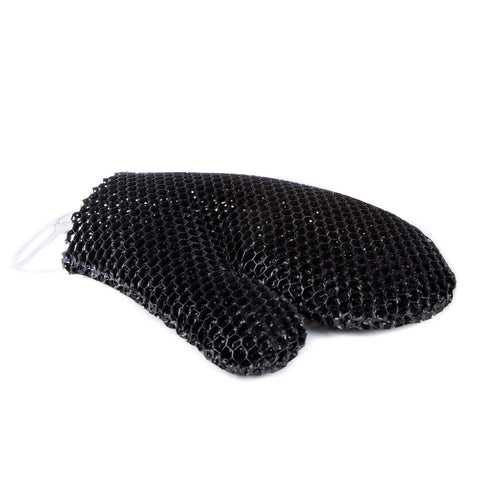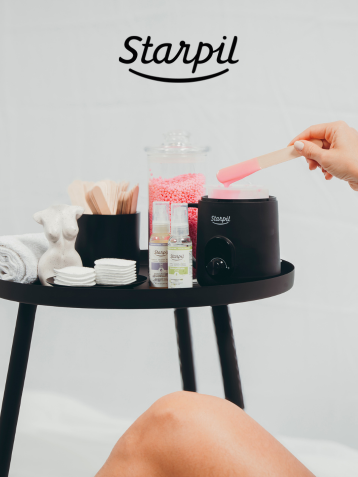Exfoliating and Waxing | The Definitive Guide

As professionals and clients, we all want waxing appointments to be of the highest quality and provide flawless results.
Our estheticians know how crucial exfoliating is before waxing, but many of our clients are still wondering when and how they should exfoliate because of conflicting information out there.
No client ever wants to do anything to negatively affect their waxing experience on purpose. Still, it's up to the professionals to let our clients know the best protocol for their pre-waxing and post-waxing care.
Table of Contents
Of course, clients should (and usually do!) always aim to come in with their skin clear and free of blemishes, ingrown hairs, razor bumps, or any other breakouts.
This means helping them achieve smooth skin without the side effects that might hinder providing them with the best service every time. The best way to do this is by practicing proper exfoliation before waxing.
We're here to give you the definitive guide you need to educate your clients and answer some top questions regarding exfoliating and waxing.

Do I Need To Exfoliate Before Waxing?
Yes, you need to exfoliate before waxing. Try to fully exfoliate 2 days prior to your waxing service to prep your skin and get its surface clear and ready for waxing.
Why should you exfoliate before waxing? We’re glad you asked. Here are some reasons why exfoliation before waxing is important:
For flawless results, you’ll always want clear skin before waxing. Waxing services are best when performed on skin free of breakouts, irritation, or any other physical abnormalities.
The client's hair needs to be softened up for easy removal. Exfoliating before waxing does just that. Hence, clients will experience less discomfort during their service.
What is Exfoliation?
Exfoliation works by removing the superficial layer of dead skin cells and helps prevent ingrown hairs from occurring, so you'll receive smoother results with each treatment.
Exfoliating also helps reduce redness after waxing services because it will remove any particles of dirt or oil from the skin's surface. Clients will feel less sting and tenderness after their waxing service if they exfoliate before a treatment.
Since waxing itself provides a measure of light exfoliation, if you have a build-up of dead skin cells, the wax adheres more to the skin and less to the hair making for a more painful wax with not as desirable results. If you take preliminary steps to get rid of the dead skin cells before your waxing appointment, the wax will grip onto your hair rather than on the skin and make for a much better service.
Why You Should Exfoliate Before Waxing:
As new skin cells develop, the older ones rise to the visible surface. While some of those skin cells shed naturally, many of them get caught up in a blend of sweat, dirt, and sebum.
This layer can serve a purpose, adding more protection onto the skin, but just like a house guest, it can overstay its welcome. Exfoliating the skin at least once a week can stop this skin layer from clogging pores, a dull complexion, and dry, scaly skin patches.
Skipping exfoliating skin before waxing inhibits wax’s ability to do its job, increasing hair breakage and acne after waxing and ingrown hairs.
An exfoliant can not only prepare skin for a successful waxing service, but it also helps improve skin tone and texture, revealing the younger, more even skin underneath. There are many ways to exfoliate, and many of these methods should be practiced regularly, especially at least a day before a waxing appointment.
What Happens If You Don't Exfoliate Before Waxing?
If you don't exfoliate two days before waxing, you run the risk of not only uncomfortable waxing services but ingrown hairs, acne, excess irritation, and increasing your chances of a less than flawless wax.
By not exfoliating in the proper time frame before your waxing services, the chances of hair breakage may increase, all leading to hair not being pulled out effectively and faster quicker re-growth in between services.
The client's hair may not soften up enough for the wax to adhere correctly, which will cause pain and discomfort for them while being waxed.
If you know your client doesn't have a good exfoliation routine, it might not be a bad idea to keep a 'defensive' wax on hand.
What do we mean by defensive?
Starpil's Calendula Hard Wax is a perfect blend of calendula and tea tree extracts to help protect your client's skin from any pathogens that could cause infections, bacterial growth, ingrown hairs, and acne; all things we advise a regular exfoliation routine for.
If they aren't great at exfoliating beforehand, use this wax to help be an extra line of defense against less than stellar results.
Your clients won't know how good they have it with an esthetician like yourself having their backs- then again, it might not be such a bad idea to share all the benefits your choice of wax has for them!
Not only will clients be impressed with your high-quality collection of products, but they are sure to feel reassured they are getting a service with their needs placed in the forefront and you will ultimately keep them as loyal, consistent clients.
How Often Should I Exfoliate Before Waxing?
Everyone should exfoliate two days prior to your waxing service and be exfoliating regularly each week in between all waxing appointments.
Exfoliation shouldn't be a cause of skin irritation, so it's not advised to exfoliate every single day. Each skin type is different, though, so we recommend you speak with your clients individually to offer precisely how often they should be exfoliating for optimal results.
What Type Of Exfoliation Should I Use Before Waxing?
There are a multitude of mechanical exfoliators available to prep the skin before waxing.
Be mindful, though, that harsh exfoliators can irritate the skin, which is why we recommend gentle exfoliation before waxing.
Different Methods to Exfoliate Before Waxing

It is important to acknowledge a client’s skin type when referring to different methods to exfoliate before waxing. Most of the advice below is gentle enough for daily exfoliation for all skin types, but use your best judgement when advising your clients on how to exfoliate skin before waxing.
Exfoliating Mitt

Using an exfoliating mitt or glove is one of the most popular methods of body exfoliation and a go-to for reducing ingrown hairs. These gloves gently remove dead skin off the surface efficiently and easily. With just a light rubdown once every two to three days, this mitt can work wonders on the skin.
Scrubs

- Body Scrubs: Choose body scrubs meant to exfoliate skin before waxing and protect against minor inner hair growth. If skin shows some black dots, they might indicate hairs that have not broken through the skin’s outer surface. They are light exfoliators which tend to prevent the inner hair growth from going deeper. You can either use it daily or once every two days.
- Facial Scrubs: Facial scrubs have always helped us eliminate the dead skin cells, making the skin appear fresh, light, and healthy. Although ingrown hairs are less common on the face, it is advised to scrub it before waxing to reduce potential breakouts.
Ensure that clients avoid scrubs made of crushed fruit pits as they are jagged and can create micro tears in the skin.
Brushes

Brushes for facial cleansing or dry brushing are highly popular choices when it comes to exfoliation. This method is excellent for acne-prone skin, but clients should avoid waxing or exfoliating with active fluid-filled lesions as they can spread bacteria.
You can get away with a solid facial cleansing brush for cheap all over the internet! If you’re using a dry brush, invest in one that is washable, and it can last you for years.
Loofahs and Sea Sponges

Loofahs and sea sponges are great for the entire body but preferred for exfoliating your back when attached to a back scrubber. This is popular amongst clients who are vulnerable to back acne and ingrown hairs. Light exfoliators can help you scrub off the dead skin and deal with inner hair growth if used frequently.
Chemical Exfoliators
If you face intense ingrown hair issues and no other method is working, we recommend using chemical exfoliators. These products are infused with salicylic acid or alpha-hydroxy acids, which target the dead skin cells and dissolve them. Sensitive skin clients shouldn’t use this method within 24-hours of waxing to avoid irritation.
**A note to remind your clients when using scrubs: Most scrubs contain oils, which can leave residues, not allowing the wax to adhere to the hair properly. If your client decides to use a scrub, it would be wise to remind them to do so with plenty of time in advance, like at least two days before their appointment or using an alternative method of exfoliation before waxing.
Many clients make use of chemical exfoliants to keep their skin looking its freshest and purest. These can include AHA's and BHA's. Chemical exfoliants can make skin extra sensitive, so it is advised to stop chemical exfoliants at least 2 days prior to their waxing. Waiting a few days longer will help prevent your skin from having adverse reactions to the wax.
Intense exfoliation procedures like chemical peels and microdermabrasion have a waiting period of at least a week before waxing is safe for your skin. Any use of retinol products should also be stopped for a week before your waxing service.
Things to Keep in Mind When Exfoliating Before Waxing

You want clients to remove the outermost layer of dead skin cells but not strip away beneficial bacteria and the skin’s protective acid mantle when they exfoliate skin before waxing.
The following methods should be done gently to enhance the skin, not deplete it before their service. Clients should avoid more potent exfoliation methods like deep chemical peels, microdermabrasion, or intensive retinol treatments within a week of a hair removal appointment or more depending on how invasive the treatment is.
Clients should do their exfoliation in tandem within a full skin and body care routine that includes moisturizing and hydration after.
How to Exfoliate Skin Before Waxing (A Step-by-Step Routine)

It’s best if you have a bathtub (and don’t mind a soak), but even a shower routine works too. Both methods are essential for pre-wax care and as a weekly skin-loving treatment.
Step 1: Start with a light full-body dry brushing from the bottom of the feet up.
Move in straight, even strokes toward the heart to flush lymph, and increase blood circulation. This helps to move oxygen and detox the skin while gently removing dead and dry skin cells.
When you reach the belly, circle the navel moving outward until you've brushed the entire belly.
Get back into the short, upward strokes on the torso. Move to the hands and brush up to the shoulders. When you reach the underarms, brush downward, alongside the chest and breasts.
Step 2: If you’re using a tub, soak anywhere from five to 20 minutes in Epsom salt and a few drops of your favorite essential oil. This softens and loosens dead skin cells so that even using the gentlest exfoliation method can still be extremely effective.
If not bathing, do your full shower routine and save exfoliation for last so that the water can soften the skin.
Step 3: Using a salt or sugar scrub or your preferred exfoliation method, start the process at the feet and work in the same systematic approach as the dry brushing step.
Step 4: Follow your exfoliation with a sequence of serums and moisturizers and body lotions or oils applied to the skin while it’s still wet to lock-in moisture. We recommend also using Starpil Ingrown Hair Serum, a spray that helps prevent ingrown hairs when applied before 24 hours of waxing.
What Happens If You Exfoliate Right Before Waxing?
If you exfoliate right before waxing, say within that day of waxing, you risk having excessive irritation, redness, more sensitivity, and an increase of swelling.
Exfoliation walks a fine line between just right and too much before waxing. If you wax in the proper time frame, 48 hours beforehand or so, your skin and waxing session will have its best benefits.
If you wax too soon, immediately before or even the day of, your skin could be begging for mercy by the time your wax is over! Give your skin time to heal and treat it gently by not waxing right before waxing.
Plus, as mentioned before, the favorite scrub you use to exfoliate could have too many oils that prevent the wax from adhering to your hair if you use it too close to your appointment, so hold off on those!
So, we've covered some major questions regarding, "Should you exfoliate before waxing?" Now, let's get some info on exfoliating right after waxing.
Can You Exfoliate Right After Waxing?
Waxing does create some discomfort, especially if you're new to the waxing world, so avoid exfoliating immediately after waxing.
If you exfoliate too soon after waxing, your skin could be very sensitive, but if you wait long enough-your skin will start to feel better and won't react to a gentle exfoliation.
It's usually best to wait around two days after your wax before you do another solid exfoliation. However, don't wait too long! Exfoliating is key to keeping your skin smooth and preventing bumps and ingrowns.
So once that two-day mark hits, get back into your regular routine and exfoliate two or three times every week to keep those amazing results!
Now that you have a fresh understanding of why and when to exfoliate before and after waxing make sure your clients know about it too. They'll be walking out happier and smoother than ever with the right education.
**Note for our Esthies: It's probably a habit for you to explain and stress these exfoliation takeaways to new clients, but don't forget to remind your regulars! Clients get busy, and it's only natural to forget sometimes. Keep them on the straight and narrow waxing path by kind reminders to exfoliate two days after, regularly in between appointments, and two days before their upcoming appointment.
READ: Exfoliating After Waxing: When & How to Do It Right
Final Thoughts
Whether it's indulging in a stay-at-home or at the spa day, most everyone exfoliates in some way or another here and there.
Clients don’t always understand how vital exfoliation is when it comes to their consistent waxing appointments.
Even experienced waxers may have never been told by former professionals how and when their exfoliation should take place!
As estheticians, it's best practice to give a thorough explanation to all of our clients, new and old, about the general two-day exfoliation advice. 2 days before their waxing, exfoliate thoroughly, and two days after their waxing appointment, exfoliate again.
It's important to stress how exfoliation leads to the best results, less of a chance for acne and ingrown hairs post-waxing, and also helps leave soft and glowing skin after each wax!
So, should you exfoliate before waxing? Of course! Get your client's exfoliation game strong, and you'll see them happier than ever after each appointment.






Comments